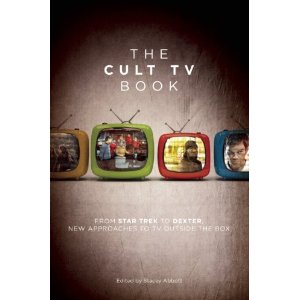 What defines a cult television series? Is it the number of viewers watching the show? Perhaps it’s the devotion of the fans? Is it the genre in which the series chooses to tell its story? The Cult TV Book (Soft Skull Press, 272 pgs.) sets out to answer these questions. Timed for publication just as Lost concluded its run as one of the most successful cult television series of all time, The Cult TV Book is a collection of thoughtful essays written by a series of writers, most from the academia, edited by Stacey Abbott. The book may appear to be some required text you’d find in an advanced television course at college, however the contributing authors are obviously fans of television as well as scholars; they all write in voices that are not pretentious, or, dare I say, nerdy, making for an informative and interesting read.
What defines a cult television series? Is it the number of viewers watching the show? Perhaps it’s the devotion of the fans? Is it the genre in which the series chooses to tell its story? The Cult TV Book (Soft Skull Press, 272 pgs.) sets out to answer these questions. Timed for publication just as Lost concluded its run as one of the most successful cult television series of all time, The Cult TV Book is a collection of thoughtful essays written by a series of writers, most from the academia, edited by Stacey Abbott. The book may appear to be some required text you’d find in an advanced television course at college, however the contributing authors are obviously fans of television as well as scholars; they all write in voices that are not pretentious, or, dare I say, nerdy, making for an informative and interesting read.
As Sergio Angelini and Miles Booy write in the book, “When cults first emerged around television shows, the appeal was to a minority audience who took content and form seriously and who came to believe that within a select number of broadcast material was being effectively smuggled in, providing viewers with something new, different, and perhaps even subversive/dangerous.”
One of the first such shows was Rod Serling’s The Twilight Zone, which used the fantasy/sci-fi genre to explore hot button issues of the 60’s like the war in Vietnam and racism. Later, Gene Rodenberry’s vision of the future, Star Trek, perhaps the most significant cult show of all time, took this idea even further. Since the 60’s, there have been numerous cult TV shows that are now considered classic television, Monty Python’s Flying Circus, The Prisoner and Dark Shadows are just a few.
In the 21st Century, the idea of what is considered “cult” has expanded and is embraced by the television networks as an “integral branding component of cross-platform marketing strategies in a multimedia age.” (p. 19). One need only look at the marketing and success of Lost as proof of this thinking. The success of Lost, and to a lesser degree, Heroes, shows that defining what is “cult” has become more and more difficult as the years have progressed.
The book has numerous case studies, in which an author breaks down and explains the “cultiness” of a particle cult TV series. Some of the usual suspects are present Dr. Who, Battlestar Galactica (the 21st Century version), and The X-Files. The inclusion of essays about South Park, Da Ali G Show, Grey’s Anatomy (!) and The Wire let us know that cult television is not limited to sci-fi, fantasy or horror. Obviously, The Wire and a show like Friday Night Lights, acclaimed dramas with small, loyal (i.e. cult) audiences would be defined as cult TV shows.
The Cult TV Book is not a book for casual fans looking for glossy pictures of their favorite TV stars. It’s an academic text with real insight into the influence cult television shows have on pop culture. That said it’s not some stuffy book that can only be enjoyed by academics. The writing is lively and engaging throughout the course of the book; it should not be confined to its own cult status.




Comments